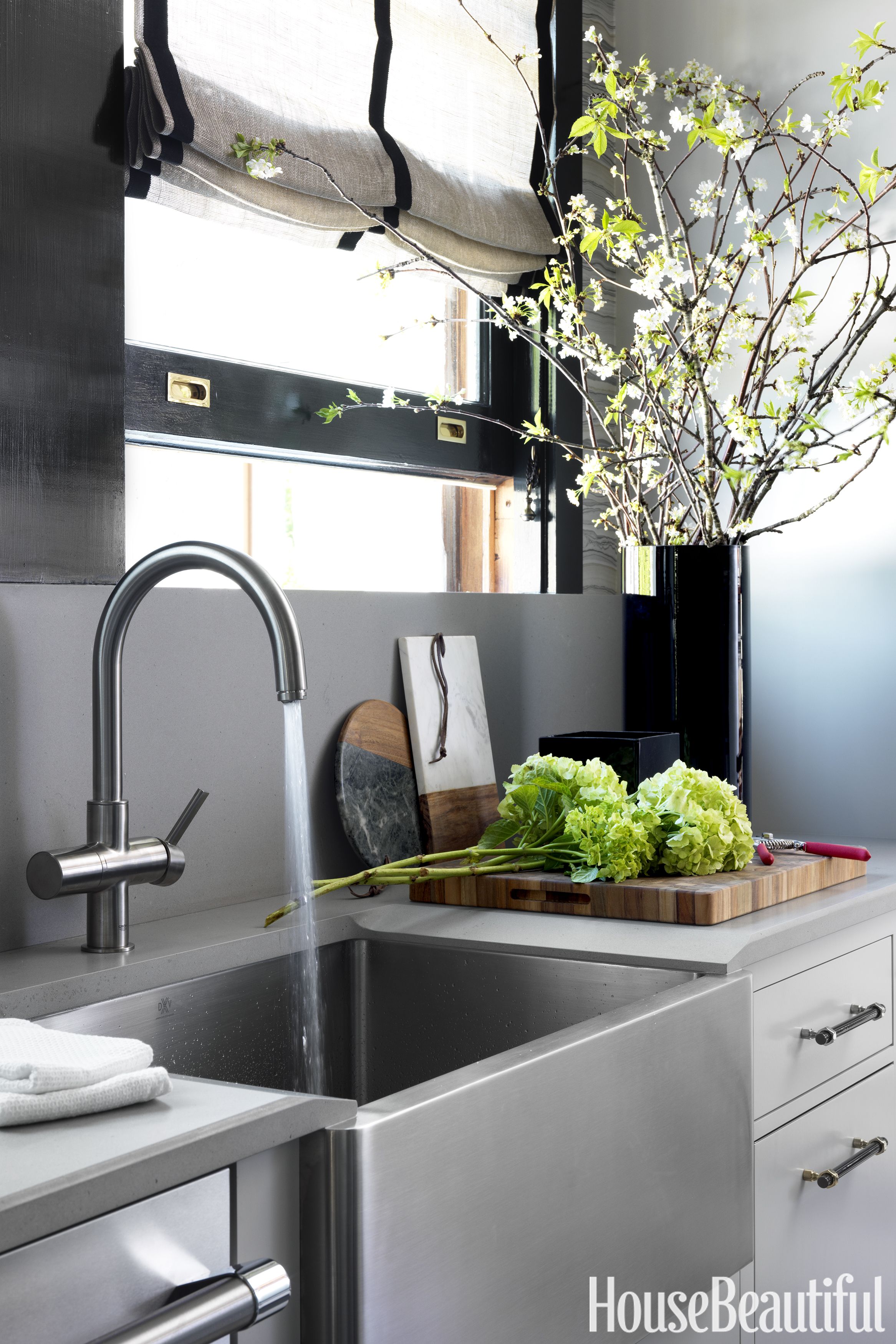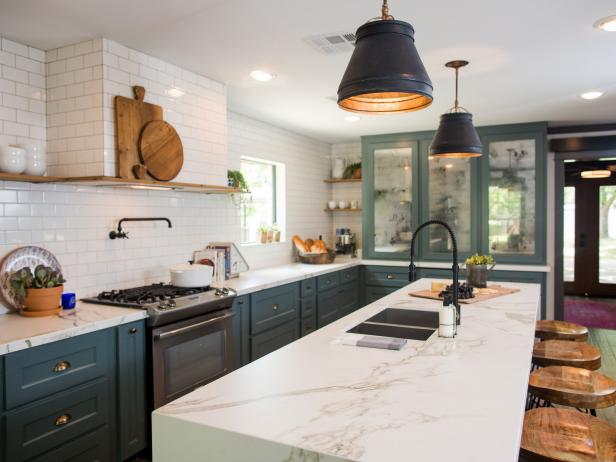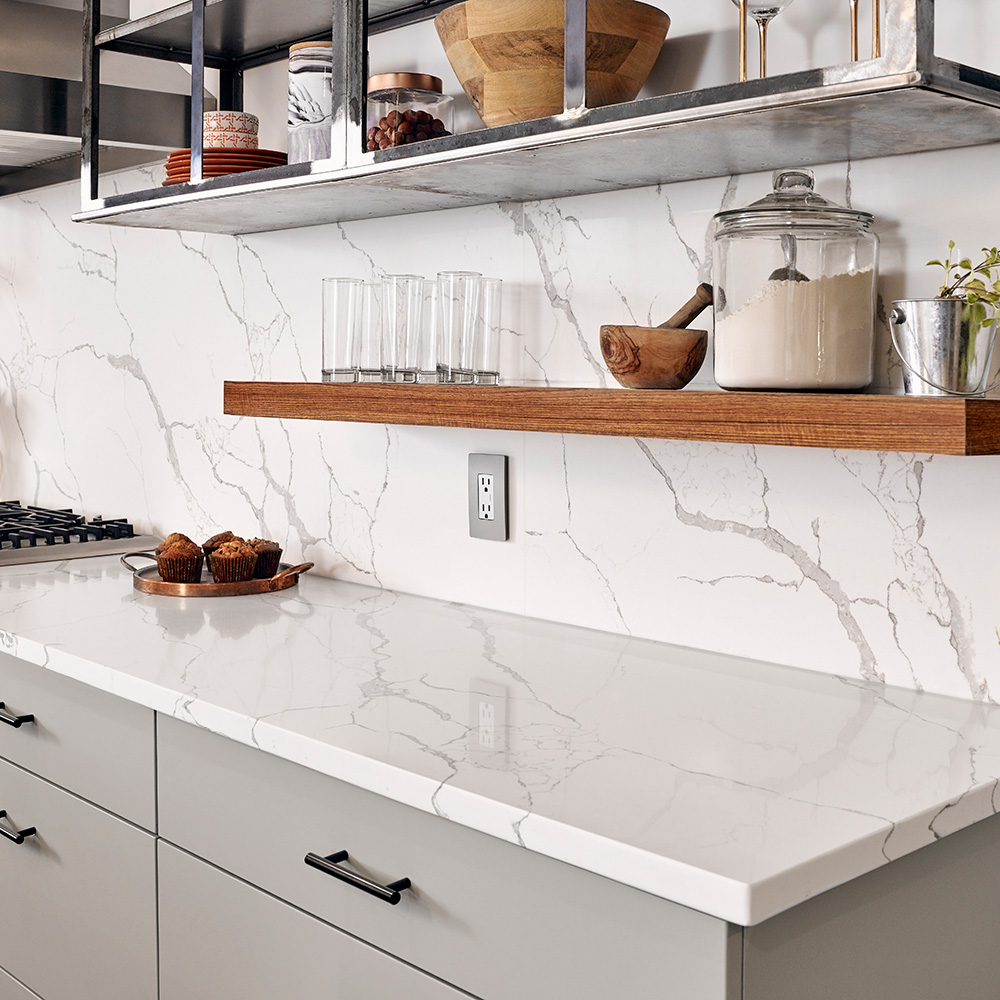When designing a kitchen, the countertop plays a crucial role, not just in functionality but also in defining the overall aesthetic of the space. Kitchen countertops come in various materials, styles, and finishes, allowing homeowners to personalize their kitchen to suit their tastes and needs. From traditional to contemporary designs, the right countertop can elevate the look of your kitchen and improve its usability. Here are some comprehensive and informative ideas to inspire your kitchen countertop design.
One popular material for kitchen countertops is granite. Known for its durability and natural beauty, granite countertops can add a touch of luxury to any kitchen. Granite comes in a variety of colors and patterns, from subtle, light tones to dramatic, dark hues with intricate veining. Each slab of granite is unique, providing a one-of-a-kind look. Additionally, granite is heat-resistant, making it ideal for cooking and baking activities. Regular sealing is necessary to maintain its appearance and prevent staining, but with proper care, granite countertops can last for decades.
Quartz countertops are another excellent option for those seeking a blend of beauty and functionality. Made from engineered stone, quartz countertops are non-porous, making them resistant to stains, scratches, and bacteria. This material is available in a wide range of colors and patterns, including options that mimic the look of natural stone like marble and granite. Quartz countertops are low maintenance, requiring only simple cleaning with soap and water. Their durability and versatility make them a popular choice for modern and busy kitchens.
Marble countertops are synonymous with elegance and timeless beauty. The natural veining and soft color variations of marble create a sophisticated look that can enhance any kitchen design. However, marble is a porous and softer stone, making it more susceptible to staining, scratching, and etching from acidic substances. To maintain its beauty, marble countertops require regular sealing and careful maintenance. Despite its high maintenance, many homeowners choose marble for its unmatched aesthetic appeal and classic charm.

For a more contemporary and industrial look, concrete countertops are an excellent choice. Concrete can be customized with various colors, textures, and finishes to create a unique and modern kitchen design. The material is highly durable and can be molded into any shape or size, offering great flexibility in design. Concrete countertops can also incorporate embedded materials like glass or metal for added visual interest. Proper sealing is essential to prevent staining and protect the surface, but with the right care, concrete countertops can be a stunning addition to your kitchen.
Butcher block countertops provide a warm and inviting atmosphere, perfect for rustic and farmhouse-style kitchens. Made from hardwoods like maple, oak, or walnut, butcher block countertops offer a natural and organic feel. They are ideal for food preparation, as they are gentle on knife edges and can be easily sanded and resealed to remove scratches and stains. Regular oiling is necessary to maintain the wood’s integrity and prevent drying out. While they require more maintenance than other materials, butcher block countertops add a cozy and timeless appeal to any kitchen.
Stainless steel countertops are favored in commercial kitchens for their durability and hygiene, but they are also becoming popular in residential kitchens. Stainless steel is heat-resistant, easy to clean, and non-porous, making it highly resistant to bacteria and stains. The sleek, reflective surface of stainless steel countertops adds a modern and professional look to the kitchen. While they can show fingerprints and scratches, these imperfections can add to the material’s industrial charm. Stainless steel is an excellent choice for those who prioritize functionality and a contemporary aesthetic.

If you’re looking for an eco-friendly option, recycled glass countertops are a sustainable choice. Made from crushed glass embedded in a resin or concrete base, these countertops are available in a variety of colors and patterns. Recycled glass countertops are durable, non-porous, and easy to clean, making them both practical and environmentally friendly. The vibrant and unique appearance of recycled glass can add a pop of color and character to your kitchen, while also reducing your carbon footprint.
Solid surface countertops, such as Corian, offer a seamless and versatile option for kitchen design. Made from acrylic or polyester resins, solid surface countertops are non-porous, stain-resistant, and easy to repair. They can be molded into various shapes and sizes, allowing for integrated sinks and backsplashes. Solid surface countertops are available in a wide range of colors and patterns, including options that resemble natural stone. Their seamless appearance and low maintenance make them a practical and attractive choice for modern kitchens.
Laminate countertops are a budget-friendly option that offers a wide range of design possibilities. Made from layers of paper or fabric impregnated with resin and bonded to particleboard, laminate countertops are available in countless colors, patterns, and textures. Advances in technology have improved the durability and appearance of laminate, making it a viable choice for many homeowners. While laminate is not as heat or scratch-resistant as other materials, it is easy to clean and maintain. Laminate countertops are an excellent choice for those seeking affordability and versatility in their kitchen design.

For a luxurious and unique countertop, consider soapstone. This natural stone has a smooth, matte finish and is available in shades of gray, green, and black. Soapstone is non-porous, heat-resistant, and has a high resistance to stains and bacteria. It develops a beautiful patina over time, adding to its charm and character. Soapstone countertops require regular oiling to enhance their natural color and prevent drying out. Their distinctive appearance and low maintenance make them a desirable option for those seeking a timeless and durable countertop.
Porcelain countertops are gaining popularity due to their durability and sleek appearance. Made from ceramic materials, porcelain countertops are highly resistant to heat, stains, and scratches. They can mimic the look of natural stone, wood, or concrete, offering a wide range of design options. Porcelain is also non-porous, making it hygienic and easy to clean. The thin profile of porcelain slabs adds a modern and sophisticated touch to the kitchen. While porcelain countertops can be more expensive, their long-lasting performance and aesthetic appeal make them a worthwhile investment.
Granite composite countertops are another innovative option for modern kitchens. Made from a blend of granite stone dust and acrylic resins, these countertops offer the look and feel of natural stone with added durability and resistance to stains and scratches. Granite composite countertops are available in various colors and patterns, providing a range of design possibilities. They are also non-porous and easy to maintain, making them a practical choice for busy kitchens. The combination of natural beauty and enhanced performance makes granite composite countertops a popular choice for homeowners.

For a sleek and minimalist look, consider glass countertops. Made from tempered glass, these countertops are highly durable, heat-resistant, and easy to clean. Glass countertops can be customized with various colors, textures, and edge treatments, allowing for a unique and modern design. The reflective surface of glass countertops can make a small kitchen appear larger and brighter. While they can show fingerprints and require regular cleaning, their contemporary and elegant appearance makes them a stunning addition to any kitchen.
Another unique and sustainable option is bamboo countertops. Bamboo is a fast-growing, renewable resource that offers a warm and natural look. Bamboo countertops are durable, resistant to moisture and bacteria, and can be sealed to enhance their longevity. They are available in various grains and colors, providing a range of design options. Bamboo countertops require regular maintenance, including resealing and oiling, to keep them looking their best. Their eco-friendly nature and distinctive appearance make bamboo countertops a great choice for environmentally conscious homeowners.
Last, terrazzo countertops offer a bold and artistic design option. Made from a mix of marble, granite, glass, or other materials set in a cement or resin base, terrazzo countertops are highly customizable and available in a variety of colors and patterns. They are durable, heat-resistant, and easy to clean, making them suitable for kitchen use. Terrazzo countertops can create a unique and eye-catching focal point in your kitchen, adding a touch of artistry and individuality. Their long-lasting performance and aesthetic versatility make them a popular choice for those seeking a statement piece in their kitchen design.

Common Mistakes to Avoid:
One common mistake when choosing a kitchen countertop is not considering the overall kitchen design. It’s important to select a countertop material and style that complements the cabinets, flooring, and backsplash. A mismatch in design can create a disjointed look that detracts from the kitchen’s overall aesthetic. Taking the time to consider how the countertop fits into the broader design scheme can result in a cohesive and visually appealing space.
Another mistake is prioritizing aesthetics over functionality. While the countertop needs to look good, it also needs to meet the practical needs of your kitchen. Consider factors like durability, maintenance, and resistance to heat, stains, and scratches. Choosing a countertop material that aligns with your lifestyle and cooking habits can prevent future frustrations and ensure the countertop remains in good condition.
Underestimating the importance of maintenance is another common error. Different countertop materials require different levels of care and maintenance. For example, natural stone countertops like marble and granite need regular sealing to prevent stains and damage. Understanding the maintenance requirements of your chosen material and being prepared to commit to them can help keep your countertops looking their best.

Improper installation is another pitfall to avoid. A poorly installed countertop can lead to problems like uneven surfaces, gaps, and weak seams. It’s crucial to hire a professional installer with experience in the specific countertop material you’ve chosen. Proper installation ensures that the countertop is securely and evenly placed, providing a stable and durable surface for years to come.
Ignoring the impact of lighting on the countertop’s appearance is another mistake. The way a countertop looks under different lighting conditions can vary significantly. It’s important to consider how natural and artificial light will affect the appearance of the countertop. Viewing samples in your kitchen under various lighting conditions can help you make a more informed decision and ensure the countertop looks as expected in your space.
Not setting a realistic budget is a common issue when selecting kitchen countertops. Countertop materials can vary widely in cost, and it’s important to factor in not just the cost of the material but also installation and maintenance expenses. Setting a realistic budget and sticking to it can help you avoid overspending and ensure you choose a countertop that fits within your financial constraints.
Last, overlooking the resale value of the countertop is a mistake. While you may plan to stay in your home for many years, it’s wise to consider how your countertop choice will impact the resale value of your property. High-quality, durable, and aesthetically pleasing countertops can increase the appeal and value of your home. Choosing a timeless and popular material can make your kitchen more attractive to potential buyers in the future.

What is the best material for kitchen countertops?
The best material for kitchen countertops depends on your specific needs and preferences. Granite, quartz, and marble are popular choices for their beauty and durability. Granite is heat-resistant and offers a unique, natural look, but requires regular sealing. Quartz is non-porous, resistant to stains and scratches, and requires less maintenance. Marble is elegant and timeless but more prone to staining and scratching. Other options like concrete, butcher block, stainless steel, and recycled glass each have their advantages and drawbacks. Consider factors such as durability, maintenance, appearance, and budget when choosing the best material for your kitchen countertops.
How do I maintain and clean my kitchen countertops?
The maintenance and cleaning of kitchen countertops vary depending on the material. For granite and marble, regular sealing is necessary to prevent stains and damage. Clean these surfaces with mild soap and water, avoiding harsh chemicals and abrasives. Quartz countertops are low maintenance and can be cleaned with soap and water. Avoid using bleach or harsh chemicals on quartz. Butcher block countertops require regular oiling to maintain the wood’s integrity and prevent drying out. Stainless steel countertops can be cleaned with a mild detergent and water, and polished with a stainless steel cleaner to remove fingerprints. Always follow the manufacturer’s recommendations for the specific material you have.
Are there eco-friendly options for kitchen countertops?
Yes, there are several eco-friendly options for kitchen countertops. Recycled glass countertops are made from crushed glass embedded in a resin or concrete base, providing a sustainable and durable choice. Bamboo countertops are another eco-friendly option, as bamboo is a fast-growing, renewable resource. Concrete countertops can also be environmentally friendly, especially if they incorporate recycled materials. Solid surface countertops made from recycled content are available as well. Choosing eco-friendly countertops helps reduce your environmental impact and supports sustainable practices.

Can I install kitchen countertops myself, or should I hire a professional?
Installing kitchen countertops can be a complex task that requires precise measurements, proper tools, and expertise. While some materials like laminate or butcher block may be more suitable for DIY installation, others like granite, quartz, and marble are best left to professionals. Professional installation ensures that the countertops are properly and securely placed, preventing issues like uneven surfaces, gaps, and weak seams. Hiring a professional can save you time and stress and ensure a flawless result. If you choose to DIY, make sure to thoroughly research the installation process and have all the necessary tools and materials on hand.
How do I choose the right countertop color and pattern?
Choosing the right countertop color and pattern involves considering the overall design and color scheme of your kitchen. Look for a countertop that complements your cabinets, flooring, backsplash, and appliances. Neutral colors like white, beige, and gray are versatile and can fit into various design styles. Bold colors and patterns can create a striking focal point, but it’s important to ensure they don’t overwhelm the space. Viewing samples in your kitchen under different lighting conditions can help you visualize how the countertop will look. It’s also helpful to consider long-term trends and how the color and pattern will age over time.
What should I consider when setting a budget for kitchen countertops?
When setting a budget for kitchen countertops, consider the cost of the material, installation, and maintenance. High-end materials like marble and quartz can be more expensive, while options like laminate and butcher block are more budget-friendly. Installation costs can vary depending on the complexity of the project and the material chosen. Factor in the cost of any necessary tools or additional materials if you’re considering a DIY installation. Maintenance costs, such as sealing for natural stone countertops or regular oiling for butcher blocks, should also be considered. Setting a realistic budget that includes all these factors will help you choose the best countertop for your needs without overspending.

Related articles: